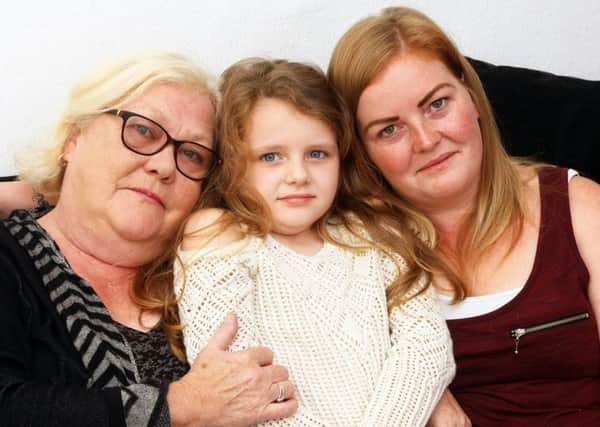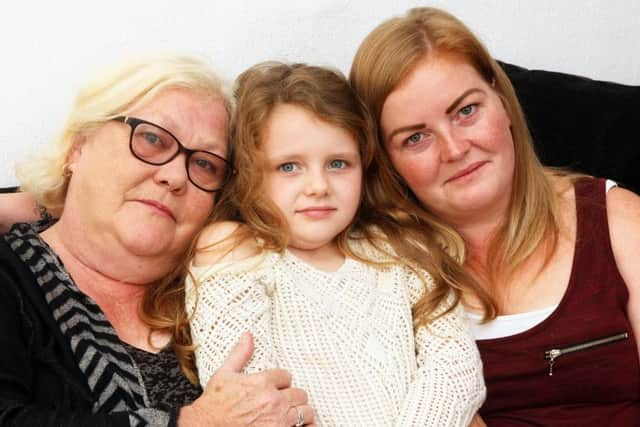VIDEO: '˜People with epilepsy failed by the system'


Her seizures come out of the blue, sometimes months apart, but when they happen, there can be six in one go, one after the other.
Epilepsy has affected Mary-Kate’s short-term memory and left her unable to work but because she ‘looks healthy’, she has been refused a Personal Independence Payment (PIP).
Advertisement
Hide AdAdvertisement
Hide AdThe 27-year-old, of The Strand, Goring, has to rely on financial support from her parents, Gillian and Tom, who live in Littlehampton.


Gillian is now speaking out to support the national charity Epilepsy Action, which is campaigning to change what it sees as a failing system.
She said: “Mary-Kate has really violent, tonic clonic seizures. She looks like she’s been hit by a truck after a seizure. She doesn’t get any warning that they’re coming. One moment she can be talking to you and the next she’s just gone and in the middle of a seizure.
“We don’t have any idea of what triggers her seizures either. Her seizures happen in clusters. They often don’t stop by themselves and so we have been told to phone for an ambulance every time they start. If we don’t do this, there’s a real chance that we could lose her.”
Advertisement
Hide AdAdvertisement
Hide AdMary-Kate used to work full-time in telesales and played for Worthing Rugby Football Club Ladies Side but she developed epilepsy shortly after giving birth to her daughter, Katie, in 2011.
At first, she received Disability Living Allowance and then PIP when the system changed. When she had her assessment, she received zero points and an appeal failed.
Gillian said: “For somebody to give you a 20-minute interview and decide you are fine is wrong.
“Mary-Kate was helpful, answering all the questions and letting them know exactly how much epilepsy affects her life. We also had letters from two neurologists, one of which I paid for privately, her GP and her family support worker. All of these letters explained how much Mary-Kate’s epilepsy impacts on her life and the fact that it is likely to always be this way.
Advertisement
Hide AdAdvertisement
Hide Ad“It is unlikely that Mary-Kate’s epilepsy will ever be fully controlled by medicine. In spite of all of this, we received a letter that said that Mary-Kate was not eligible for PIP.
“The report we got from the DWP said things like Mary-Kate could look them in the eye and conduct a conversation, and that she looked healthy. It took no account of the fact that she hadn’t had any seizures that day.
“It also didn’t recognise the constant risk that she is under at all. All the way to the tribunal, they took no notice of the evidence we had from medical professionals who are involved in Mary-Kate’s care.”
Over the past six years, Mary-Kate has had fits every few months. Her most recent was six months ago and she has gone a whole year without one but when they come, they are violent and exhausting.
Advertisement
Hide AdAdvertisement
Hide AdGillian said: “Mary-Kate can go for a long while without having a seizure but when one happens, it inevitably means she’ll have more over the coming days.
“It’s like we get lulled into a false sense of security and then it hits us all over again. After a seizure, or a cluster of seizures, she is completely wiped. She is unable to do anything for herself during these times.
“On top of this, Mary-Kate has to live with the side-effects of her epilepsy medicines every day. She’s completely exhausted. After she’s dropped Katie off at school, she has to come home and sleep for a few hours just to be able to function.
“Because Mary-Kate gets no warning when her seizures are about to happen, she is incredibly anxious about doing things like cooking or showering, and I think that she’s right to be.
Advertisement
Hide AdAdvertisement
Hide Ad“She said to me ‘mum, what would happen if I had a seizures when I had a chopping knife in my hand and Katie found me?’. It’s heartbreaking to hear your daughter say stuff like that. I help a lot with cooking and we’ve installed a lifeline alarm in their flat. Katie is trained to press the red button on the alarm if anything happens.”
Having been refused PIP the first time, Mary-Kate applied again but had the same response on appeal. Gillian said she could not go through it again. She receives a small amount of benefit and has her rent paid but beyond that, it is down to her parents and brother Tom to chip in.
Gillian said: “She was a really happy-go-lucky girl before. Now she gets really bad memory loss because of the fits. It feels like epilepsy has taken that person away, and that’s not helped by her not receiving the financial support of PIP that she so desperately needs.”
Visit epilepsy.org.uk/pipcampaign for more information about the campaign.